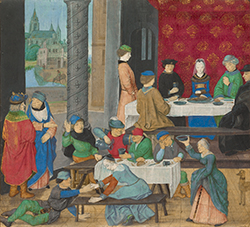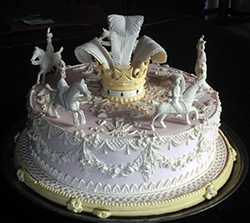The Art of Food
Archival Program Information
For current Research Institute events, please see The Getty Event Calendar
For current Research Institute events, please see The Getty Event Calendar
Lecture Series
The Art of Food Lecture Series explores culinary history and practices, and the artistic display of food, and its preparation. This series of events complements the exhibitions The Edible Monument: The Art of Food for Festivals, on view at the Getty Research Institute from October 13, 2015, to March 13, 2016, and Eat, Drink, and Be Merry: Food in the Middle Ages and Renaissance, on view at the Getty Museum from October 13, 2015, to January 3, 2016.

|
|
Dining Well at the Medieval Court
Lecture by Christina Normore
Sunday, November 15, 2015
3:00 p.m.
Museum Lecture Hall, Getty Center
From the agrarian cycle of planting and harvest to the religious cycles of fasts and feasts, food deeply structured the life experiences of medieval people at all social levels. Christina Normore, professor of art history at Northwestern University, explains how banquets marking important occasions offered a range of sensuous pleasures for the tongue, eye, and ear, as well as a range of moral lessons, tying together the ethical and the pleasurable to form an ideal of the good life for medieval elites.
Lecture by Christina Normore
Sunday, November 15, 2015
3:00 p.m.
Museum Lecture Hall, Getty Center
From the agrarian cycle of planting and harvest to the religious cycles of fasts and feasts, food deeply structured the life experiences of medieval people at all social levels. Christina Normore, professor of art history at Northwestern University, explains how banquets marking important occasions offered a range of sensuous pleasures for the tongue, eye, and ear, as well as a range of moral lessons, tying together the ethical and the pleasurable to form an ideal of the good life for medieval elites.
Playing the Scalco: Serving Meals Directly from Renaissance Banquet Literature
Lecture by Ken Albala
Sunday, January 10, 2016
4:00 p.m.
Museum Lecture Hall, Getty Center
Ken Albala, professor of history at the University of the Pacific and author of over 20 books on food, discusses the large body of cookbooks, banquet guides, and carving manuals of early modern Europe, while sharing his personal experience of organizing and serving meals from them. These books were clearly meant to be used by culinary professionals, but how good was their advice?
Lecture by Ken Albala
Sunday, January 10, 2016
4:00 p.m.
Museum Lecture Hall, Getty Center
Ken Albala, professor of history at the University of the Pacific and author of over 20 books on food, discusses the large body of cookbooks, banquet guides, and carving manuals of early modern Europe, while sharing his personal experience of organizing and serving meals from them. These books were clearly meant to be used by culinary professionals, but how good was their advice?

|
|
Making Sugar Sculpture
Workshops by Ivan Day
Sunday, January 31, 2016
11:00 a.m. and 1:00 p.m.
Museum Studios, Getty Center
Using traditional tools and techniques, food historian Ivan Day demonstrates how to create sugar sculpture. Day, an authority on British and European culinary history, specializes in the development of sugar as a sculptural medium and is well known for his recreations of historic meals and table settings.
11:00 a.m., Workshop 1: Learn to ornament an 18th-century twelfth cake using original molds and equipment from the period.
1:00 p.m., Workshop 2: Learn to make sugar tazze using original molds and equipment from the 18th-century.
Workshops by Ivan Day
Sunday, January 31, 2016
11:00 a.m. and 1:00 p.m.
Museum Studios, Getty Center
Using traditional tools and techniques, food historian Ivan Day demonstrates how to create sugar sculpture. Day, an authority on British and European culinary history, specializes in the development of sugar as a sculptural medium and is well known for his recreations of historic meals and table settings.
11:00 a.m., Workshop 1: Learn to ornament an 18th-century twelfth cake using original molds and equipment from the period.
1:00 p.m., Workshop 2: Learn to make sugar tazze using original molds and equipment from the 18th-century.
Eating the Edifice
Lecture by Ivan Day
Sunday, January 31, 2016
4:00 p.m.
Museum Lecture Hall, Getty Center
In this illustrated lecture, food historian Ivan Day outlines the evolution of edible table art from the early Renaissance to the 19th century. From gilded sugar coins distributed at 15th-century Italian wedding feasts to edible models of Victorian London omnibuses, edible table art has been of interest to people for hundreds of years. Day will introduce the materials, equipment, and molds used by past masters of such edible ephemera.
Lecture by Ivan Day
Sunday, January 31, 2016
4:00 p.m.
Museum Lecture Hall, Getty Center
In this illustrated lecture, food historian Ivan Day outlines the evolution of edible table art from the early Renaissance to the 19th century. From gilded sugar coins distributed at 15th-century Italian wedding feasts to edible models of Victorian London omnibuses, edible table art has been of interest to people for hundreds of years. Day will introduce the materials, equipment, and molds used by past masters of such edible ephemera.
Royal Cavities: The Bitter Implications of Sugar Consumption in Early Modern Europe
Lecture by Joseph Imorde
Sunday, February 21, 2016
4:00 p.m.
Museum Lecture Hall, Getty Center
This lecture outlines an etiology of sugar in the 16th and 17th centuries and uses it as a starting point to discuss the cultural history of this specific form of "conspicuous consumption" up to the present. The popularity of refined sugar brought with it a considerable increase in tooth disease in the highest circles. Those who consumed sweets continuously and in large quantities were punished by fate with considerable tooth decay. Joseph Imorde is professor of art history at the University of Siegen in Germany.
Lecture by Joseph Imorde
Sunday, February 21, 2016
4:00 p.m.
Museum Lecture Hall, Getty Center
This lecture outlines an etiology of sugar in the 16th and 17th centuries and uses it as a starting point to discuss the cultural history of this specific form of "conspicuous consumption" up to the present. The popularity of refined sugar brought with it a considerable increase in tooth disease in the highest circles. Those who consumed sweets continuously and in large quantities were punished by fate with considerable tooth decay. Joseph Imorde is professor of art history at the University of Siegen in Germany.
Bartolomeo Scappi's Paper Kitchens
Lecture by Deborah L. Krohn
Sunday, March 6, 2016
4:00 p.m.
Museum Lecture Hall, Getty Center
Deborah L. Krohn, associate professor and director of Master Studies at Bard Graduate Center, discusses the first illustrated cookbook, Bartolomeo Scappi's Opera dell'arte del cucinare (1570). In her newly released publication, Food and Knowledge in Renaissance Italy: Bartolomeo Scappi's Paper Kitchens, Krohn demonstrates that Scappi, the most famous chef of the Italian Renaissance, was at the vanguard of a new way of looking at the kitchen as a workshop or laboratory.
Lecture by Deborah L. Krohn
Sunday, March 6, 2016
4:00 p.m.
Museum Lecture Hall, Getty Center
Deborah L. Krohn, associate professor and director of Master Studies at Bard Graduate Center, discusses the first illustrated cookbook, Bartolomeo Scappi's Opera dell'arte del cucinare (1570). In her newly released publication, Food and Knowledge in Renaissance Italy: Bartolomeo Scappi's Paper Kitchens, Krohn demonstrates that Scappi, the most famous chef of the Italian Renaissance, was at the vanguard of a new way of looking at the kitchen as a workshop or laboratory.